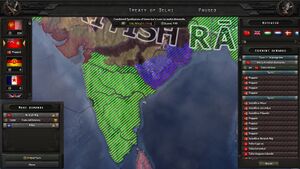A peace conference allows the victors of a war to make lasting changes to the status of the losing countries, such as annexing them or liberating new nations from their territory.
Triggers
Most typically a peace conference gets triggered by a country losing so many victory points that it is forced to capitulate and subsequently surrender. If multiple faction members fight a war together and some of them are major powers, they will only surrender once all those majors capitulate. These conditions are checked daily.
The losing side of a war may also offer peace. In this case the losing side may reject the resolutions of the peace conference and the war continues.
Setup
In the case of unconditional surrender, the peace conference is created between the country that was forced to surrender (recipient) and the enemy that has the highest war participation against it (actor). The countries participating on the winning side are determined as follows:
- any country that is at war with the recipient and is not at war with the actor
- if any two of those countries are at war with each other
- remove the non-faction member if exactly one of them is in the same faction as the actor
- remove both otherwise
- remove any countries that are more than 50% occupied by non-allied winners of the war (e.g. in a historical outcome Poland does not take part as a winner because they are occupied by the Soviet Union)
The losing side contains all countries that
- fulfill the conditions for surrender above
- are at war with all winners
- at peace with the recipient
- have at least some war participation dealt against them
- or were removed from the winning side due to being occupied
Score
Each country on the winning side gets points equal to their war participation against all the countries on the losing side. They can use these points throughout the peace conference to make demands in turn. Whenever a country passes on its turn, it gains points equal to 20% of what it had at the start of the conference.
Turns
The country with the highest score gets to make demands first. From then on the turn passes to whichever other country has the highest remaining score. This means that lower scoring countries may never get their turn if higher scoring countries pass frequently or have enough score from the beginning to take everything. Once a country has made a demand it can not be disputed within the conference.
Depending on their country specific rules, countries can pick from a range of options:
- taking territory
- changing ideology
- puppeting
- liberating new countries (potentially as puppets)
- transferring their remaining score (when a different winner is selected)
- passing their turn (increasing their score by +20% of the initial value)
- ending their demands entirely, distributing their remaining score among allies
A country can also make demands on behalf of another winner (by selecting their flag on the left) but still needs to spend its own score for it. Actions taken will cost different amounts of points and cause world tension depending on relevant war goals, ideologies and territorial claims.
A country can only spend 30% of its current score each turn or the difference to the second highest scoring country, whichever is higher.
AI
The behavior of AI countries largely depends on their ideology.
Democratic
Democratic nations strongly favor liberating countries, especially if those are democratic as well. They tend to change the government of non-democratic countries and take little land for themselves unless they have claims on it. Democracies can't puppet in peace deals, but can by releasing nations.
Communist
Communist countries prefer puppeting surrounding countries, avoiding overseas territories.
Fascist
Fascist countries favor annexation of states but also create some puppets on other continents.
Non-aligned
Non-aligned countries have a more muted approach and will mostly just take claimed territory.
Resolution
When all winners are done making demands and, in the case of conditional surrender, the loser accepts, the selected changes get implemented. The winners stop being at war with the losers, ownership and control of states change according to the demands. World tension gets reduced by a fraction of what the war initially caused but this is usually offset by demands that cause new tension.
